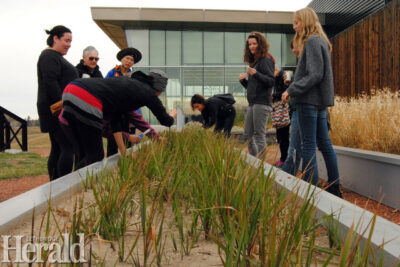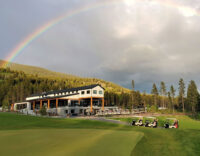Herbalism connects people to land and each other
By Theodora MacLeod - Lethbridge Herald Local Journalism Initiative Reporter on November 11, 2023.
 Herald photo by Theodora MacLeod
Members of the Sikoohkotooki Home Herbalism Circle gather sweetgrass at the Galt Museum.
Herald photo by Theodora MacLeod
Members of the Sikoohkotooki Home Herbalism Circle gather sweetgrass at the Galt Museum.As the weather began to transition into the brisk temperatures of the season, a group of local home herbalists gathered as they have since spring of this year. Sikoohkotooki Home Herbalism Circle, led by Jördis Weilandt, a space to connect and exchange knowledge, gathered to discuss autumn and the fast approaching winter recently at the Galt Museum.
“Plants have always been my connector to people but also the land,” says Weilandt.
Hailing from an island in the east of Germany in the Baltic Sea called, Rügen, she says her village life lent itself to forming a strong connection with the natural world and both gardening and plant-based health care weren’t uncommon in her community. Despite her early connection to the environment, Weilandt says herbalism is a passion that came to her later in life. Her decision to form the home herbalism circle in Lethbridge came after taking a course at the University of Calgary that involved Blackfoot teachings, most of which connect to the earth.
While living in China, which she did for a decade, Weilandt learned about preventative care in eastern medicine, including the usage of plants for health. She says that unlike in China and other parts of the world where herbal health remedies are common, many people in North America don’t regard their health as something they are in control of. “Disconnection is something I really noticed when I moved here.”
The objective of the home herbalism circle seems, above all, to be about connection. To community, to environment, and to oneself.
“The home herbalism circle is a way where (sic) people can come together who live here -people who call Lethbridge their home- and share what and who they acknowledge and use.”
It’s a collective of resource sharing, something she feels is a responsibility that comes with learning. As much knowledge of the land comes from traditional Indigenous understanding, she emphasizes the idea of exchanging information to benefit one another.
“Living here really means us needing to learn from each other, and with each other, and develop paths forward.” She hopes to participate and facilitate this learning without the western understanding that historically has meant taking knowledge from communities and offering little or nothing in return.
Eli Rahmani has been a part of the group from the first meeting and says gatherings usually involve the opportunity to test some of the herbal remedies Weilandt brews, and as the sessions generally happen outdoors, they are an opportunity for participants to connect with the land. Though her experience with plants and herbalism prior to joining the circle, Rahmani says with her knowledge has come more interest.
“I got motivation to just (pay) more attention to nature.”
Since its inception, the group has grown in size and knowledge, something Weilandt hopes to see more of in the next year. As fear brews around the topic of climate change, she believes there is still so much to be learned from plants and hopes if people adopt more holistic and herbal approaches to health, they might to change their perspectives on living. “A lot of people can imagine the end of the world, but not the end of colonial thinking.”
12-11





Would it not be important to show that these herbals actually have an effect on health?